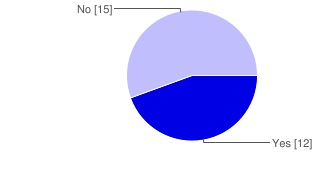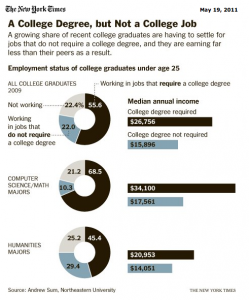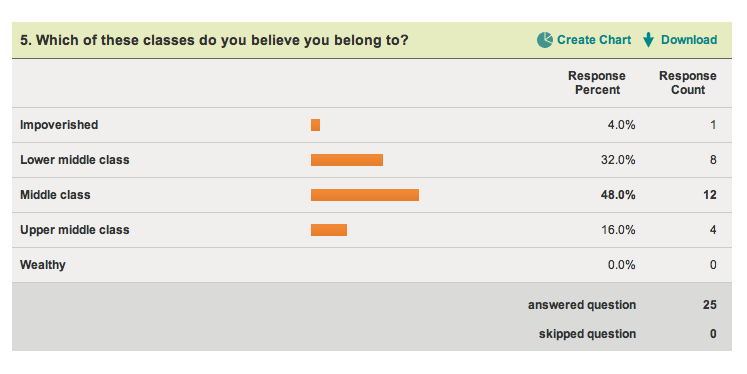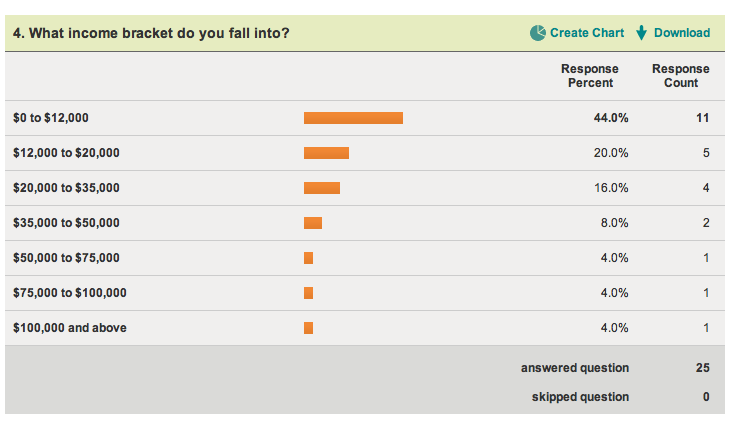After finding an apparent correlation between the health of the economy and the health of the people, a survey was born to see just how people are affected and what they have been giving up at the cost of their health.
Continue reading
Category Archives: Survey Results
Survey Says: Occupy Wall Street More or Less Legit
In a previous post about public perception of the Occupy Wall Street movement, we speculated on the factors contributing to the legitimacy of the protests. In an effort to acquire more concrete evidence, we conducted a survey for our readers to tell us about their opinions of Occupy Wall Street and what led them to those conclusions.
The majority of the responses showed that our readers supported the protests.
Among those supporters, however, it was split right down the middle as to whether or not they had felt that way from the beginning.
However, for the majority of those who claimed to have changed their minds since Occupy Wall Street began, it was more a case of the development of an opinion where there previously had not been one at all. More than twice as many people answered that their initial lack of an opinion became a positive one. The rest said they had changed their initially negative opinions for the better. Not one response indicated that the person had started off in support of the movement, but had since turned against it.
But when it came to which factors influenced any kind of change in opinion, we mostly missed the mark with our guesses in the original post. We suspected that the appearance of celebrities and unions, as well as the proliferation of the movement in other cities across the U.S., would affect public opinion as to the legitimacy of the efforts at Occupy Wall Street. Not one of our hypotheses was mentioned. Instead, respondents said it was the media coverage of the protests that mostly informed their opinions.
The few respondents who maintained that their opinion had either developed into a negative one or had been negative from the start said that the protesters’ lack of organization was a key reason.
The Occupy Wall Street movement aside, the majority of responses reflected support for protests in general – that they were an effective way to bring about change, mostly because of the attention they bring.
 The personalization of an issue that protesters can bring was also referenced as a testament to the effectiveness of such demonstrations.
The personalization of an issue that protesters can bring was also referenced as a testament to the effectiveness of such demonstrations.
But would those people put their money where their mouth is and show up at a protest themselves? Most said they never had before, but would for the right cause. About half as many said they had been to protests before, including Occupy Wall Street. True to the American spirit, those who said they would never attend a protest because they thought it was a waste of time were in the minority.
Even grad students with jobs rely mostly on scholarships and loans
Q: Do you work during grad school?

A few weeks ago, I asked how graduate students feel about working during school. How many students work while in grad school, I wondered, and how are they balancing employment with academics?
Who Says Bugs Can’t Be Tasty?
A few weeks ago, I posed some simple yet pointed questions to peers and classmates: would they consider eating bugs as an alternative protein form in their diets. And, if they would not, what it would take to change their minds?
The biggest obstacle facing insect consumption in the Western world, as mentioned in a post two weeks ago,
Continue reading
What People Are Not Giving Up to the Crisis
The financial crisis takes no prisoners. If there is something we have learned in the past months, it is that people are losing it all to recession: their jobs, their houses, their sanity.
Workforce Experience & The Economy: A Survey… THE RESULTS
With Senate Republicans recently blocking a portion of the president’s Jobs Act and proposing alternative measures, the issue of employment — or the persistent lack thereof — remains an important issue in the United States…
Earlier this month, a potentially groundbreaking survey was introduced on this blog. The ambition was to gain a sweeping overview about diverse experiences in the workforce amongst a random sampling of common people that monitor my Facebook newsfeed.
So, let’s take a look at the survey results… Selected findings are below and a summary can be found here… now with informative charts and graphs!
When did you enter the workforce?
- Dates ranged from August 1998 to September 2009
- 1/4 of respondents said “Yup”
- 3/4 of respondents said “Nope”
- All said “Absolutely”
- 22% replied 3-6 months
- 22% replied more than 1 year
- 44% replied “still going strong!”
- 11% replied 1-3 months
- 45% replied “Yup”
Of these, here are some highlights:
- Psychology study guinea pig
- Census taker
- Mariner Moose
- Babysitting
- There were nearly equal responses from 2 to 5, indicating that people ranged from not terribly frustrated to very frustrated with the current job market based on their personal experiences seeking employment.
- Within 5 Years – 33%
- Within 3 Years – 33%
- Within 1 Year – 22%
- No Idea – 11%
————————————————————————————————
(post originally published 10/02/2011)
President Obama’s latest weekly YouTube address focuses on the economy… again:
The president doesn’t seem terribly pleased with his congressional colleagues, does he? He urges Congress to “get their act together” and pass The American Jobs Act proposed three weeks ago.
View more White House documents

With a national unemployment rate still north of 9% and the government set to release its September monthly employment report next week, jobs remain a central element in many economic conversations.
And perhaps no group is being hit harder than recent college grads… us!
So let’s talk about it! We’ve all clearly managed to survive so far, but how did we do it? Perhaps some people got creative… or maybe capitalized on an apparently economically viable hereditary characteristic (this is an option?!)
Please take a moment to answer the following brief survey about your personal experience in the workforce. (OR CLICK HERE)
In the next few weeks, technology permitting, the fascinating results will be discussed… titillating insights gleaned… and maybe the future of the Western economic system will be saved. Maybe…
Thanks for your participation!
(http://bit.ly/osODgt)
Surveying the Land: A Survey of the Results of my Prior Survey, “Working Outside the Box: A Survey”
Recently I posted a survey asking readers about how the economy had affected their employment situation. Specifically, I wanted to find out whether people were having to seek work outside of their primary field.
My survey received fourteen responses, nine of which were useful for analysis (unless there really is an international man of mystery who has been forced into the domestic mystique market by these tough times).
I asked respondents to rate the impact that the recession has had on their field of employment on a scale of 1 to 5, where 1 meant little to no impact and 5 meant a substantial impact.
Of respondents who said that the impact has been severe, 4 respondents rated the recession’s impact on their field at a 4, and 2 at a 5. 2 of the remaining 3 rated the impact as 3, indicating a moderate impact, and the remaining respondent rated the impact at a 1, or minimal impact.
The field least affected, according to these results? Speech-language Pathology. It makes sense; one would think any fields related to treating disorder and disease, those perennial friends of humanity, would not be vulnerable to market pressures the way that other fields are.
The fields moderately impacted, according to those working in them: used books and semiconductors. Books may be on their way out thanks to e-readers, but the cheap paperback retains its charm for the time being. Semiconductor companies provide the components for a wide array of digital electronics; for that reason, it’s safe to say that the field is more threatened by technology that would render it obsolete than by market forces.
What fields have been most drastically affected, according to these results? The 2 respondents who rated the impact at a 5 worked in food service and writing and publishing, respectively.
All 4 of the respondents who rated the impact of the recession on their field were in education, both as workers and students.
In terms of personal impact, 3 respondents said that over 50 percent of their current income is from work they do outside of their primary field; the rest either rely on outside work for a small portion of their overall income, or not at all.
What to make of these results? What do you think? Based on your experience or what you’ve read, are they indicative of larger trends?
How Does The Economy Affect Students’ Sex Life?
Two weeks ago, I asked my readers whether the economy was affecting their sex life. And it turned out that my readers were also students, who have been even more flat broke since the economy collapsed.
So then what happened to their bed?
Of the students surveyed, 33 percent said bad news about the economy was a source of stress and anxiety. 25 percent of them said these stress and anxiety were affecting their libido. Only 6 percent of the students surveyed said their own economic situation was affecting their sex life.
Nevertheless, most of the respondents think there is a strong link between one’s economic situation and one’s sex life.
“I’m sure there is a definite relationship between how much money a man may make in the market one day to whether or not he decides to initiate sex with his partner or visa versa,” said an anonymous respondent. “Like you said, money is sexy.”
Some of them learned that lesson at their own expense.
“I had spent four years in college pretending poor person even though I lived off my parents’ money, which was very sexy to college girls who read too many books,” said Sean, 25 years old. “When I moved [back] home, however, and actually had no money, I also had no sex. My economic situation has most definitely affected my sex life. Girls are expensive.”
“It’s tougher to have games when you’ve got nothing to back it up. You can’t try to pick a girl at a bar and tell her, ‘Hey, wanna go back to my mom’s place ? I’ve got an XBOX, you can be my Playstation,’ ” said Vincent, 22.
Rodrigo, 31, reminds us that girls also are affected by the economy.
“I think for many that only relied on one way to meet others of the opposite sex will suffer. However, the economy is not biased towards either males or females, so we are all in it together,” he said.
And one of them advises you to be creative if you’re broke.
“More or less willing to go out and spend money when my cash is limited. Otherwise though, there are plenty of ways to date without spending much or anything at all,” said Amital, 22. “The key is to be open and honest and also think creatively.”
Low Income Americans Will Splurge But Not Break The Bank
In a previous post I explored the topic of consumer spending post-recession. Recent articles in The New York Times have pointed to both overall increased consumer spending and a consumer focus on non-necessities. I decided to conduct a survey to better understand the nuances of consumer choices from a variety of income levels.
Forty-eight percent of the respondents called themselves middle class and 64 percent identified their incomes as $0 to $20,000 a year. Those results tell us a lot about how subjective the definition of “middle class” is, but that is a topic for another post.
Although 48 percent of survey takers said they never shop for non-essentials and 52 percent said they only shop once or twice a week, the highest percentage of people, 40 percent, said they were willing to spend $60 to $85 on one item they badly wanted.
More tellingly, the survey results do link stress to the purchasing of luxury items. Fifty-six percent of respondents said they sometimes yield to the temptation to buy something they could not afford if they have had a stressful week.
Americans may not be Spartans but the results are not as epicurean as I would have expected after reading recent articles on consumer habits. The majority of respondents, 60 percent, said they spend more money on non-essential practical items than luxury goods and 36 percent of survey-takers said they spend an equal amount of money on necessities and wants.
Headhunters: Useful or Not? – The Results
During a time when many Americans are actively looking for work, I wrote a post two weeks ago questioning the legitimacy of headhunters. There were numerous sources singing the praises of employment recruitment, seeing it as the best way to hire these days.
But if this was so, where were the numbers to back these claims up?
First off, the experts didn’t seem to agree. CareerXRoads, a resource for professional recruiters, released their annual Source of Hire Survey in March of this year. Of the 200 companies they surveyed, the highest number of hires in 2010 were from personal referrals at 27%. Hires from Third Party Sources, or headhunters, made up a mere 2.3% of new hires.
But these numbers were from the companies themselves. What, then, did everyday people – those who are either employed or searching for work – think?
My own findings reflected the corporate ones. Of over 50 people surveyed, only 32% reported that they had ever used any kind of job recruitment.
“Never really saw the purpose,” wrote Alicia Thompson, a social worker from Pennsylvania. “It seems easier to find jobs through personal connections than paying someone else to search for jobs.”
In fact, the 68% who never used employment agencies expressed distaste for them, seeing them as unneccesary middlemen.
“I’ve had friends and family members advise me to stay away, specifically because of the quality of employment they usually procure,” wrote Chris Davis, a graduate student from California.
Lindsay Hurst, a high school Spanish teacher from Virginia, has stayed away as well, but for different reasons.
“I like helping myself,” she wrote.
But as a teacher, Hurst may have made a good choice. A few others claimed they never sought out headhunters because they believed their chosen professions were ill-suited for the work of those agencies, such as education and health care.
Which is mostly true. There are very few options of recrutiment agencies for those in education, with the exception of operations like Education Pioneers who match high achieving graduate student with careers in public education. And agencies like B.E. Smith work in health care, but only on the executive or managerial level.
But what of the 32% who say they have tried headhunters? Despite the promise of success and simplicity, most who did contract a headhunter have had negative experiences.
“It’s easier, but they weren’t thorough at all,” Dave Blumberg, a Customer Experience Analyst, writes of his experiences with a temp agency. “They did not understand my skill set and it was very impersonal. I missed a phone call from the agency trying to staff me, and when I called back five minutes later they had already filled the position.”
Most complained of similar woes, saying the agencies did not really understand them, or were unsuccessful in helping them find work.
“I felt that I found better job matches while searching on my own,” wrote Jenna Krauter, a Creative Arts Therapist.
In fact, the success stories were rare among those who did use an employment agencies.
However, Catherine Wilensky, a statistician from Washington, D.C., said she would absolutely use a contingency employment agency if she ever needed to look for work again.
“It seems to be as painless as possible,” she wrote, “and they matched me with opportunities that seemed to be a good fit.”
Overall though, people like Wilensky seem to be in the minority. For each one story of a speedy job placement, there were five of wasted time and feelings of being patronized.
So whether the data is coming from the corporations themselves, or people who have used their services, there seems to be little evidence in support of the overall success of headhunters.
Looks like in these trying times of unemployment, we unfortunately have to keep going at it ourselves.










